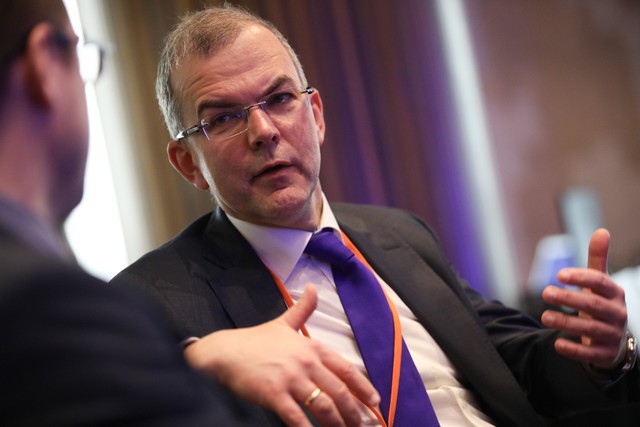You cannot be wealthy if you do not take risks - Interview
Hans-Jörg Naumer : Since I work with active portfolio management, whenever I speak of this topic, I blow my own trumpet, but I have to admit, I really do believe in active management. I am aware of the fact that more and more retail and institutional investors invest their money - at least partly - into index funds, ETF-s, but I think they primarily decided to do so because this investment vehicle is cheap.
However, price alone means nothing. You have to find the investment vehicle where you get the best possible service for the expenditures you pay.
I believe the popularity of ETFs has reached a peak point now and a declining trend will soon follow. This has several reasons. I am personally a huge fan of behavioral finance, one of the ground thesis of this is that investors do not behave rationally. If investors are not rational, the markets cannot be efficient. Due to this, we have a lot of opportunities to generate alpha, return above the benchmark index.With ETFs, we invest into the past and we all know that past performance does not guarantee the same returns in the future. Think about the TMT-bubble, also known as the dot-com bubble. Everyone was over-invested into the technology, media and communications sectors, because they saw it performing well, they could not however, foresee that the whole thing would collapse on them. In such a case, individual stock selection, diversification and risk management would have helped, which you don’t have with passive investing. The case was similar in 2008, when everyone was over-invested in the financial sectors that caused the collapse.
I think that overall, the demand for ETFs will lose steam. Of course, this is not the market consensus, many analysts believe, that they still have room to run. But if we include disruptive technologies into our analysis is getting more and more apparent that investments into ETFs are investments into the past.
We recently made an analysis about the compulsion of the S&P 500 index: we concluded that up until the 1990’s, on average, a company was part of the index for 60 years. Today, this number is merely 12 years and this time is getting shorter and shorter due to disruptors. Thus, investors will have to be smart and invest into an actively managed product.

That’s a smart question. We can truly say that every investor is only human, Mr. Spock from Star Trek, who was cool and rational like a computer, does not exist. It is also true that there are some portfolio managers, who can’t even reach the benchmark returns. It is therefore, also the responsibility of the investor to pick the most suitable mutual fund.
There are of course, also some fund managers, who are able to perform well on the long term as well. It depends on the skill, the experience of the fund manager and the quality of the analysis which he uses as well. We for example don’t only receive analysis from big banks, but we have a research team spread out through the entire world. In addition to finance professionals, we employ physicists and mathematicians as well. We realize that there are a lot of approaches from which the markets can be observed, we have a separate firm for that as well, called Grassroots Research. We actively communicate with the CEOs, CIOs, and CFOs of the firms where we invest, we get firsthand information whenever the firms intend to launch a new product. They are also able to reflect on our own analysis.
A good analysis therefore, doesn’t mean simple number crunching, a lot depends on the quality of information as well and how actively we can communicate with the participants of the market.
In addition, a good manager has experience through many investment cycles, not to mention the importance of investment processes and monitoring these as well. Alone, it is not enough if a wealth manager is smart, the investment process has to be smart as well. The TMT bubble was largely caused by the lack of a monitoring system as well, which would have revealed that most of the investors are buying simply because others are buying as well.Machines on the other hand, don’t make the same, emotion-driven mistakes that humans do. What do you think, are machines slated to replace fund managers as well?
There is a chance, at least partly. I’ve spent a considerable time recently analyzing this issue and I concluded that to us, wealth managers, it means a challenge and an opportunity at the same time, if we implement these methods. We manage a various different types of portfolios - for many different and highly skilled (institutional) clients, e.g. pension funds - the way I see it, there are a lot of various investor preferences attached to these as well and to serve these, we need a wide range of investment strategies.
We conduct fundamental and quantitative analysis as well and although most of this is done by professionals as of now,. In addition, we have colleagues, who use algorithms to better analyze and control the flow of information as well. This can help us notice trends and correlations that we might miss without using these algorithms. Currently, implementing these technologies is the biggest challenge.
Can robots do the jobs of wealth managers? I would say, partly yes.
Portfolio managers manage a lot of money, computers help them analyze things, notice patterns, organize better, but we’re far from being able to run a program at your home laptop, which entirely replaces the work of a wealth manager.If you had to name a few shares or security types which could serve as long term investments, which would these be?
I don’t like stock picking, I prefer mutual funds. I think that right now, the ones that concentrate on blue chip, dividend stocks in Europe can be potent investments, in addition, tech shares from developed markets might generate suitable return on the long term.
Despite the risks, are you optimistic about the European stock markets as well?
I’m neither optimistic nor pessimistic, I try to be as realistic as possible. Without doubt, we can expect volatility, the French, German elections, the slow pace of the Italian reforms will all generate uncertainty in the European markets. We also have to consider deglobalization and Donald Trump. If inflation heats up once again and prices start to rise, and as long as debt will be financed by the ECB’s money printing mechanism, and we’ll have the same outlooks for growth, I would say we will have a positive outlook for European shares.
Obviously, we can expect risks and volatility, but it might pay off to invest into European securities right now.
One of the reasons for this is that larger investors are still underinvested in European stocks. Even though we can see a change of sentiment, we are still far from being able to say the opposite. The other reason is that I see that most of the volatility has been priced in already. If we look at the P/E ratios and the Schiller P/E ratios - I especially prefer the latter -, we can easily realize that there is a huge difference between smaller European markets as well. The deeper South we go, the lower these ratios get.Nationalist politicians like Le Pen believe that they are not threatening the stability of the financial sector. In fact, they believe that they will generate growth in their countries and therefore mean an attractive place of investment. What do you think, is there a valid point in these arguments or they’re just trying to calm their voters?
I think they’re just sweet talking. We can hardly see any chance of Le Pen winning, judging by the polls we’re seeing from France, Le Pen is not that popular and will be defeated in the second round. Of course, you can never know. Let’s assume that she becomes president. In this case, she will be very isolated and the country will have a president who will not have the majority in parliament, the National Front will remain in minority. Due to that, it will be difficult for her to make the reforms she wants without the support of the parliament, she will not be able to realize all her plans and ideas. Despite that, if she gets elected, volatility will without doubt grow. All in all, this can hurt the French economy and the whole of Europe as well.

Partly yes. I believe it is not only the tax reforms that we should watch though, we should also monitor his Keynesian debt policies as well, since he wants to make America great again by increasing the debt levels of the country. We’ll soon see what outcome this will have.
Doesn’t the debt ceiling restrict his attempts?
It certainly does restrict some of his reforms. He reached the debt ceiling a few days ago and in order to pass his reforms, he will have to close a lot of public institutions: schools, museums. He will not be able to do everything he planned to do.
Do you think there is potential in any Eastern European country as a long term investment? What do you think of Russia?
There is a strong correlation between the Russian stock markets and the oil prices. This is not good, because it’s not as diversified as it should be. On the long term, I don’t think the Russian stock market has a good outlook. The country is also struggling with a demographical problem, here the short life expectancy is the main problem.
Frankly, I’d avoid investing into Russia right now.
Is Hungary right to be optimistic?I think so, yes. There are a lot of firms in Hungary that manufacture for the developed European markets, therefore the performance of Europe will affect the Hungarian market as well. If however, the Eurosceptic sentiment gains ground - as in other countries -, this may scare away foreign investment. Hungarians can only lose with deglobalization.
In an analysis, you wrote that on the long term, capital income will substitute labor income as the main source of wealth in the world. Currently, we can see that most people avoid the stock market, in fact, many retail investors don’t trust any sort of investment vehicle. How do you think, people can be taught the necessary level of investor consciousness required to achieve this concept?
This question is not easy to answer, since this means a challenge for us all. I believe that people have to realize that they cannot be wealthy if they do not take risks somehow. In Germany, people commonly say that the difference in the wealth of various social layers is widening, even though they don’t know the real numbers. If we’re talking about wealth, we also have to talk about risk premiums.
I believe that social inequality is in large part caused by risk premiums - and the willingness to take risks.
You don’t get risk premium if your money sits on your bank account or you invest it into sovereign debt. Diversification is of course, important, but you have to take risk, mutual funds offer the perfect combination of the two.It pays off to take risk, I made a calculation that shows that on the American market, in the past 200 years, there were barely investment periods of 30 years where stocks didn’t outperform government bonds. On the long term, risk serves to your advantage. Of course, it is important to diversify, but it’s never enough to keep your money in one asset class. It’s also important to target dividends, which can also help you ease up on volatility.
It is also a widespread problem that many people who invest on the long term take their money from their savings account before the target date and spend it on luxury items. How do you think retail investors can be educated to invest on the long term?
People have to be taught, here we can see the importance of financial advisors and the importance of simple, transparent investment vehicles. People should understand the difference between investing and speculation. In the best case of course, an investor should always pay attention to the markets, the news and the charts.
If we invest, we should always make a strategy and should follow it through, no matter what happens.
Volatility won’t go away, it always has been, it always will be, you don’t have to pay attention to it. What matters is that you should always keep your chips on the table.












